Novum Romanum Imperium -- A Tuscany DW AAR
- Thread starter Avindian
- Start date
-
We have updated our Community Code of Conduct. Please read through the new rules for the forum that are an integral part of Paradox Interactive’s User Agreement.
You are using an out of date browser. It may not display this or other websites correctly.
You should upgrade or use an alternative browser.
You should upgrade or use an alternative browser.
You know, a thought occurs to me (an unpleasant one at that) -- if I inherit Milan, will they insta-core? On a related subject, the two Milanese provinces would automatically leave the Empire (as in the Damned German Empire), once I inherit/integrate?
You'll insta-core them, since they're the same culture group, but I don't think they'll leave the Empire instantly. Best keep a couple of magistrates in reserve, I guess.
I'm really enjoying this AAR, but I couldn't help but note a few discrepancies.
Firstly, your fleet could only be named "Byzantia" after the old name for Constantinople. Byzantium only began to be called by its current name by historians in the 18th century - is contemporaries always called it the Roman Empire.
Secondly, I'm afraid that the Empire is showing a bit too much disregard for religion to be plausible. True, Renaissance kings weren't as religious as Medieval ones, but Christianity was a very important part of their lives.
I intended the fleet to be named after the city, and not the Empire. The disregard for religion is probably a bit of author's bias, but I take your point. I generally try to avoid religious discussions for the sake of not offending people.
I've been following for a while, and I have no idea why I haven't commented! In any case, this is a great update, and I love the way you weave the game play elements into the story.
Thanks, and welcome aboard!
I demand the next emperor abolish the council!
Heh. I might do that, in time; the Senate does force me to introduce new characters periodically, which may be a plus or minus, depending on your perspective.
You'll insta-core them, since they're the same culture group, but I don't think they'll leave the Empire instantly. Best keep a couple of magistrates in reserve, I guess.
Thanks; that's a relief. I was under the impression that in DW, leaving the HRE was all or nothing, but I hardly ever remember to use the magistrates I've got anyway
The next emperor shouldn't abolish the council...They are far too important in the actual running of the country...for now
The next emperor shouldn't abolish the council...They are far too important in the actual running of the country...for now
It won't be soon, if ever -- once I'm closer to actually having a proper Roman Empire redux, we'll talk.
Im loving this AAR, and have been reading it for around 9 pgs straight. I even went back and read your Ukraine AAR as well! Keep up the good work, and keep the updates coming! 
Never say never
What did you just say ?!?!?!
*Starts making noose*
What did you just say ?!?!?!
*Starts making noose*
*Gathers straw, pitchfork and torch"
But then a question...
What, no love for the nights of the Old Republic?
*Gathers straw, pitchfork and torch"
But then a question...
What, no love for the nights of the Old Republic?
No !!! + Im meaning that song "Never say never" Hrrrhh....
Im loving this AAR, and have been reading it for around 9 pgs straight. I even went back and read your Ukraine AAR as well! Keep up the good work, and keep the updates coming!
Thanks for the kind words!
What did you just say ?!?!?!
*Starts making noose*
*Gathers straw, pitchfork and torch"
But then a question...
What, no love for the nights of the Old Republic?
No !!! + Im meaning that song "Never say never" Hrrrhh....
I have no idea what you two are going on about -- I guess I'd better update soon!
Sorry for the delay, but I should have an update today or tomorrow.
Chapter 22: New Emperor, Same pain for the Turks
13 July 1545, the Castle St. Maso
Francis I had a relatively easy first year as Emperor of Tuscany. That didn't mean he didn't make some important decisions, however. He'd ordered the raising of the VIII Legio 'Roma'. The Empire now had 80,000 men at arms, including infantry, cavalry, and artillery.
There were also some more administrative changes. Sir Andreas Germanicus retired from public life; the strain of the regency was simply too much for him to handle. He still served as Commandant of the Legionary Academy, but the role was increasingly purely ceremonial. His 100th birthday was approaching rapidly; it was time to let another member of his family take his place. His son, Gaius Germanicus, was already quite old himself -- into his 60s -- so it was his grandson, Drusus Germanicus, that became the new face of the Germanicus family. [1] Drusus had no official responsibilities or titles, other than Count and Senator, which he inherited from his grandfather. Since he could devote most of his time to politics, unlike many of the other Senators, he was already becoming infamous as one of the most argumentative members of the Imperial Senate.
Francis I had appointed his good friend, Daoud Selim Iskander, as Foreign Minister. Daoud was not a Senator and he was not a noble; although Francis was perfectly within his rights to name him a Count, he did not wish to antagonize the rest of Europe by ennobling a man who some called a terrorist. Axel Gathenhielm remained Chancellor, as well as Duke of Istria-Sardinia.
What most concerned the new Emperor, bureaucrat as he was, was administration. The Empire of Tuscany was not the single wealthy province of Maso I's time; it spanned two continents, had a new capital, and citizens of nearly every religious affiliation known to Europeans. The Senators were forced to juggle many responsibilities (apart from Drusus Germanicus), and while some handled their duties with aplomb, certain Senators seemed to age five years between every monthly session. Tiberius Graecus, Archduke of Constantinople, rarely attended meetings of the Imperial Senate, ordering his eldest son, Demosthenes, to take his place. Although this was not unprecedented when Senators were ill, it was clear that the duties of the Archduke of Constantinople were far too much for one man to handle.
To alleviate these problems, Francis I, on the very first day of his reign, made the office of Governor mandatory for all provinces in the Empire of Tuscany. This had been Andreas Germanicus' official title in Milan, but the Emperor wanted every province to have one. The Governor would be appointed by the noble of that particular territory (or the Emperor himself, for Tuscany or Milan). It was a full-time position; a Governor, even if he were a noble, would be ineligible for any other offices. He would handle the day-to-day tasks of administration, but he did answer to the Duke or Archduke and would be expected to provide reports. The Duke or Archduke was still the ultimate authority, and he had plenty of responsibilities (primarily judicial) remaining, but this would allow the Senators to spend at least 75% of the year in Rome, where they could focus on the issues that plagued the Empire.
He made one other important decision. To prevent the succession problems that occurred at the end of John II's reign, he introduced a law -- which was subsequently passed -- that required all Emperors to publicly name a successor immediately after the death of the previous one. It would no longer be done via private or secret documents such as the Last Will and Testament of the previous Emperor. Francis I already had an heir, although he didn't know it -- his wife, a Milanese princess whom he'd married shortly after his coronation, was pregnant. He'd decided to name Andreas Germanicus his successor in the event of his untimely demise, and had announced that at the first meeting of the Imperial Senate. Many were concerned about Germanicus' age, but nobody doubted his integrity or his service to the Empire.
As he reviewed the latest reports from the Governor of Florence -- since there was no blood successor to the Imperial Throne, there was no Prince of Florence -- the Chancellor approached to the Throne.
"Yes, Chancellor, what is it?"
Axel looked pale. "Emperor, I've been going through the records in the Tuscan archives. Far less than 25% of our territory is legally recognized by the courts of Europe as Tuscan; even one more province could cause untold problems."
Francis frowned. "What do you mean?"
"Well, without being legally recognized as the sovereign territory of the Empire of Tuscany, many of the more educated citizens might feel more rebellious if we're too overextended. They would feel they have legitimate claims to secede from the Empire, proclaim their own country, or even challenge your claim to the Imperial Throne. I would recommend we, perhaps, scale back our expansionary efforts for the time being."
As Francis was about to agree, a herald announced the acquisition of a new province -- Sinope had finally defected to the Empire. Francis and Axel looked at one another and gulped.
The easy days were over.
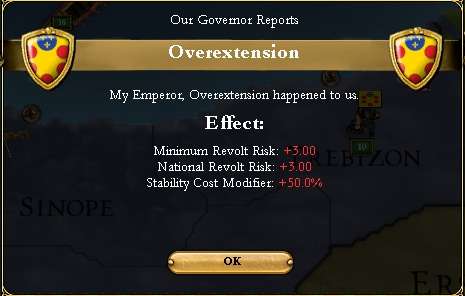
--------------------------------------------------------------------------------------------------
21 March 1546, Castle St. Maso
The problems caused by overextension were surprisingly mild. Thanks to widely separated legions throughout the Empire, no one province was too distant from 10,000 loyal soldiers, eager to serve and protect the citizens of the Empire. No major rebellions had broken out, and Francis I was glad for that. He'd also ended the war with the eastern Hordes; now that he had Sinope, he had no further desire to expand into the Caucasus.
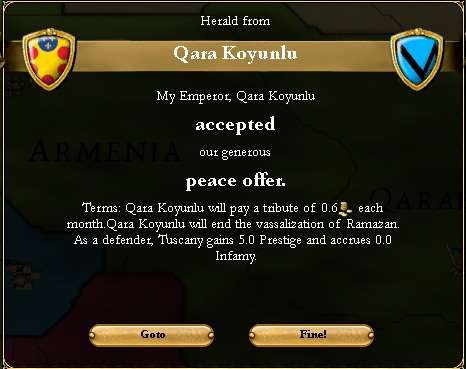
A distant relative had been blabbing secrets, but Francis I could not bear executing him. That weakened the spy networks of Foreign Minister Iskander, but there was little to be done. [2]
Spies and bureaucracy were the furthest thing from his mind right now, however. He had a son! Leopoldo Farnese was the newest Prince of Florence and Heir to the Throne, causing a sigh of relief through the entire Empire. The lad was truly gifted, as the soothsayers proclaimed.
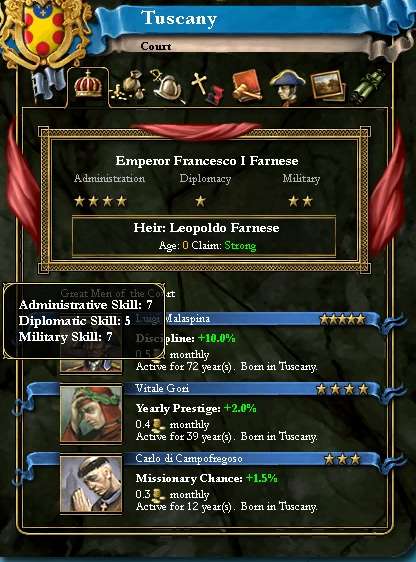
Although a devout Protestant, Francis I nonetheless insisted on keeping his son in Italy. He was very distrustful of the Monks of the Teutonic Order, particularly after the von Brecht incident, and wanted him to go to the finest schools in Italy. There would be no regent in Florence -- the Governors made that unnecessary. The Emperor would serve as a "Duke" in Florence.
His son was baptized by the Court Theologian, Count Carlo di Campofregoso. Everybody gathered applauded, and Francis I smiled from ear to ear. An Emperor and a father! How could life get any better?
--------------------------------------------------------------------------------------------------
1 December 1546, the Foreign Minister's office
Daoud Selim Iskander, the Foreign Minister of the Empire of Tuscany, felt frustrated. He had little problem talking the Emperor into liberating his homeland of Alexandria when it was controlled by the Mamluks; unfortunately, Castille had seized the port city and the surrounding areas. Castille was a force to be reckoned with, and Francis did not relish fighting other Europeans yet. At one time, Daoud had been one of the most feared men in all the world; now he was stuck behind a desk. He knew that Francis had given him this post as a reward, but it meant that it was increasingly difficult to coordinate his once-formidable network in Africa and the Holy Land.
Daoud began to question coming to Tuscany in the first place. Their fears of unrest with new expansion made them uneasy to conquer any new lands. He'd wanted to use his office to sponsor rebellions in the Levant, but these proposals were inevitably turned down. He was ordered, instead, to keep an eye on the Ottoman Empire. He snorted at the sound. The Ottoman Empire was almost completely useless these days. It certainly was not the feared Empire that he'd grown up hating.
The only thing that kept him loyal to Francis was his personal friendship with the Emperor. Even that seemed questionable, however, as he'd rarely seen the Emperor outside of meetings of the Imperial Senate -- as Foreign Minister he attended, but did not vote. He was too busy with his new son, which was justifiable. For a moment, Daoud wistfully thought about a family of his own someday.
A palace aide knocked on his door. Daoud looked up from his daydreaming and growled "Enter!"
The aide bowed. "Minister Iskander, by international law there can be no war without hostilities; a de facto peace now exists between the Empire of Tuscany and Malacca."
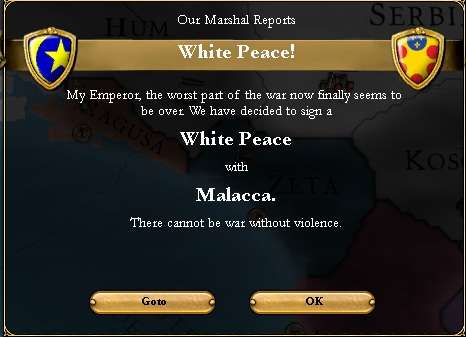
Daoud looked confused. "What's a Malacca? Were we at war with them?"
"Yes, Minister. The Muscovites called us into the war, and we answered."
"I can't even find it on a map. I guess it's good that we aren't at war any more."
The aide nodded, bowed again, and left the Minister to his brooding. Poor fellow, the aide mused. He's never looked comfortable here. He must miss his home.
--------------------------------------------------------------------------------------------------
6 June 1547, meeting of the Imperial Senate
Drusus Germanicus knew something big was going to happen at this meeting. A friend of his, Giuliano Piombante, had been named General of all Imperial Forces in the East, officially in command of Legio VII 'Asia'. Typically, the Emperor did not name generals unless some major military action was brewing. All the Senators were present, even Tiberius Graecus, who still spent at least half his time in Constantinople. That further clued Drusus that it would not be a typical session of the Imperial Senate. He was debating the purpose of the emergency session with Marius Cato when the Emperor entered the room.
"Senators, many of you know of the problems that overextension can cause. We've been fortunate thus far -- one minor rebellion in Apulia which was rapidly squashed -- but nonetheless, it could potentially be troublesome. However, we also have a unique opportunity to end the Ottoman Empire once and for all. We cannot annex the Empire in its entirety; it's still a bit too big for that. However, we can deprive them of most of their territory, leaving complete annexation for a future war. Marshal del Moro, could you give us an update on the military situation?"
Marshal Alessandro del Moro nodded. "We know of one Ottoman army of 10,000 in Edirne. I have three legions in theater, giving us superiority of 3 to 1. I don't know whether or not they have further forces to the north or not or what they have in Africa. Our naval superiority continues. I honestly cannot see any serious resistance from the Turk."
"Thank you, Marshal. Foreign Minister Iskander, a report on our allies and the allies of the Ottoman Empire?"
Iskander cleared his throat. "Using the usual back channels, I've gotten pledges from all of our allies but Muscovy. I suspect it's the size of Crimea and the fact they have no real way to get involved. Here's about what we'd be looking at if we called them all."
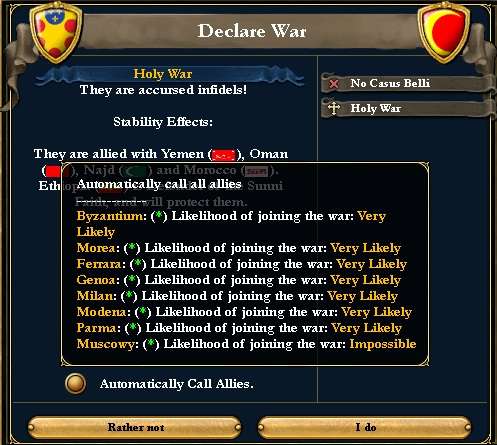
"Now, the Ottomans are allied with Oman, Yemen, Najd, and Morocco. The first three powers are of no consequence. However, Morocco holds most of North Africa and the Holy Land. If we truly wish to restore the Roman Empire to her former glory, a war with Morocco is probably inevitable, but it would complicate our mission a bit. If the Senate does vote for war, the only ally I would initially call is Byzantium. Should Morocco get involved, we could then act accordingly."
The Senators all agreed this seemed reasonable. Francis I, with as authoritative voice as he could muster, officially asked the Senate for a declaration of Holy War on the Ottoman Empire.
Drusus Germanicus had the first question. "What is our objective in this war, Emperor?"
Francis deferred that to Marshal del Moro, who replied, "At least Macedonia, Nis, and Diamentia. The first two will effectively cut off Edirne; the last will give us a staging area for any possible future operations in Africa. Maybe Silistria, but no farther north than that. We'll leave Crimea and the surrounding area to our friends in Muscovy."
Drusus nodded. That made good sense, in his view, but he'd be sure to ask Grandfather Andreas his opinion as well.
The next question, somewhat predictably, was from Archduke Graecus. "The new lands would be part of my Archduchy, correct?"
Francis I affirmed that they would be, apart from any land taken in Africa. That would be a new Duchy, which would be assigned appropriately.
There were no further questions, so they went straight to a vote. The Catos, Archduke Graecus, Marshal del Moro, Primus Tullius Cicero, and Drusus Germanicus all voted yes. Axel Gathenhielm actually voted no, not because he thought Tuscany would lose but because he was most concerned about the administrative problems a large expansion might cause. Carlo di Campofregoso abstained; he felt his position as a religious leader required him not to interfere in temporal matters, a very unique position among many of his colleagues in the Protestant Church. di Campofregoso was concerned about another von Brecht, as was Francis I, and the Emperor, as head of the Church, had made it very plain to all the Church leaders that they were to focus their attention on spiritual matters. That didn't mean they listened, but nonetheless it did send a powerful message.
With a vote of 6-1-1, war was declared on Ottoman Empire.
--------------------------------------------------------------------------------------------------
13 September 1547, Edirne
Four months into the war, every indication was that victory would come soon. All of the Turk's allies abandoned the Sublime Porte; with no support, they were doomed to failure.
The Ottoman Navy had been decisively defeated a mere week into the war.
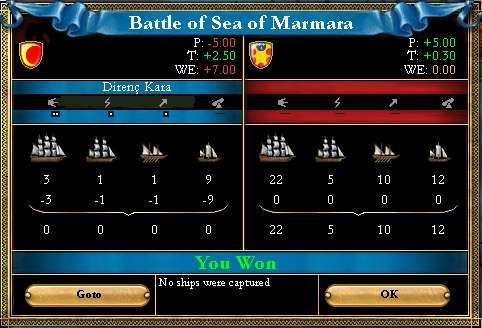
Following the complete destruction of the Ottoman fleet, Marshal del Moro ordered the division of the Tuscan fleet into two equal parts; the Classis I 'Byzantia', named after the Greek settlement that eventually became Constantinople, and the Classis II 'Datti', named after the most successful House in Imperial history. Construction was ordered to give both fleets ten cogs, enough to transport an entire legion. While the First Classis remained blocking the Bosphorus, the Second was sent to Sicily, where it would pick up the Second Legion and invade the African holdings of the Ottoman Empire.
Events on dry land were slower, but still impressive. Edirne fell very quickly. A second Ottoman army, 10,000 strong, came south from Silistria while the first remained in Burgas. Recognizing the superior defensive ground Edirne offered, General Piombante had asked the Emperor to hire a second General that would remain in Edirne to hold off an Ottoman advance.
That was when Salvestro Pieroni got his chance for glory. His father had been one of the wealthiest merchants in Tuscany, and had made a fortune in Thrace supplying the legions there. The Pieronis were also personal friends of Archduke Graecus, Something of a dilettante, he'd spent most of his early adulthood venturing around the world. He'd been in the African desert, the Alps, and had even traveled as far as China. Salvestro had no real military experience, and it showed, as he gave absolutely no credence to the Fire phase of battle. Nonetheless, his connections got him the rank he coveted, even if he didn't entirely deserve it.
In his first battle, against an army of Ottoman infantry, he actually acquitted himself quite well, thanks to the superior defensive positioning.

This only reinforced the ego of the already exceedingly arrogant General Pieroni. He cared little for the horrors of war, and like many commanders throughout history, he'd made all of his subordinates do all the work while he got all the credit. He even got a personally delivered congratulations from the Archduke. Unlike other commanders, however, he enraged many an officer by insisting it was his only personal strategic genius that won the day. In reality, he'd spent most of the battle sleeping in his tent, and woke up only after the Ottomans had already retreated. He was unpopular, to say the least, but since General Piombante was more focused on the offensive, there was little to be done.
--------------------------------------------------------------------------------------------------
8 November 1547, Bulgaria
General Pieroni preened like a peacock in front of the very expensive mirror he'd ordered ten soldiers -- one of them the former Commander of his Legion, the Legio IV 'Neapolis' -- to carry around. In flagrant disregard of General Piombante's orders to stay put and defend the Ottoman capital while more troops crossed the Turkish straits, he'd sent his already tired and foul-tempered men into battle again, this time in Nis.
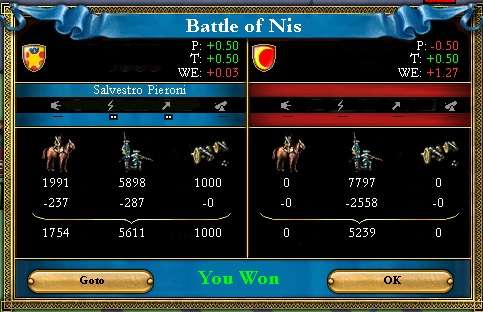
Although it was another great victory, the casualties were much worse than the Battle of Edirne. He further pushed for two conquests -- Macedonia and Nis -- so that Byzantium would not get the credit, having been called into the war just after his last victory. Pieroni could practically taste the Duchy he was sure to earn, in his mind. After all, he'd singlehandedly defeated the mighty Turk not once, but twice. The multiple letters from General Piombante -- increasingly less polite in tone -- were either discarded or simply ignored.
His aide brought him a new note, however, and this one he could not ignore -- it was from his good friend, Archduke Graecus.
My dear Salvestro --
Greetings from Constantinople! I hear you have done quite well for yourself in the field; congratulations are certainly in order. Marshal del Moro is very pleased with events and would like to thank you personally for your leadership and awe-inspiring bravery and moral courage. Please, to celebrate the new year, come to the palace in Constantinople at 7 PM on 1 January, 1548.
Hope to see you there!
Tiberius
Tiberius
If Salvestro beamed any more brightly, he probably would have burst into flames. A reception in his honor, hosted by the second most powerful man in the Empire! He was sure to get his Duchy now!
--------------------------------------------------------------------------------------------------
1 January 1548, Constantinople
Pieroni sulked. No matter how profusely Tiberius apologized, he'd still been tricked. This was no gallant festive reception -- it was a strategy session! Even when he did meet Marshal del Moro, that fool had merely clapped him on the back, said "Well done", and left. There was no hobnobbing, no party, just a small dinner and a few bottles of rancid German beer! No wine, no elegant feast! [3]
Ignoring the dandy, Marshal del Moro and General Piombante, along with Commandant Sir Andreas Germanicus, planned the campaign, to begin a month hence. It was a coordinated strike of three legions that would completely encircle the enemy force in Burgas. The Byzantines had finished off the army that Pieroni had attacked repeatedly and had besieged Silistria; they would prevent the enemy from escaping to the north. The main thrust of the attack would come from General Piombante, attacking from Thrace. The other two prongs -- one "commanded" by Pieroni from Bulgaria, the other led by the Commandant's grandson, Drusus Germanicus, who would attack from Edirne -- would cut off any possibility of retreat, attacking a day or two after the "Asian" Legion had begun it's advance.
Marshal del Moro was a little uneasy about having Drusus Germanicus command a Legion, but he'd actually been requested by General Piombante, and not his grandfather. Piombante was only five years older than Drusus, and the two had sparred together on many occasions. Piombante assured the Marshal that the mere presence of a Germanicus would ensure victory and raise morale considerably; Piombante's troops were bored and Pieroni's troops contemplating murder. More practically, Drusus was an engineer, and given that he had to cross the Evros River, his expertise would be invaluable.
The overall commander of the operation was none other than Sir Andreas Germanicus, at over 90 years old! Everybody, Sir Andreas included, recognized that this was largely ceremonial, but his mind was as sharp as ever. The battle plan was actually his idea. He would command from Constantinople. He was one of the few people in the Empire that could legitimately command respect from the disparate personalities involved; even Archduke Graecus, who was notoriously greedy and only out for himself, respected him. Marshal del Moro would be unavailable after this meeting; he was coordinating the landing of the Legio II 'Sicilia' in Diamentia in late February, early March. Everybody present knew that Pieroni was an idiot, but would never take direct orders from Piombante. After all, he hadn't up to this point. Drusus had no battlefield experience; that left Sir Andreas as the only reasonable alternative.
--------------------------------------------------------------------------------------------------
17 February 1548, Burgas
Giving Pieroni no end of grief, General Piombante was official battlefield commander at the Battle of Burgas, which completely eliminated the last vestiges of the Ottoman army.
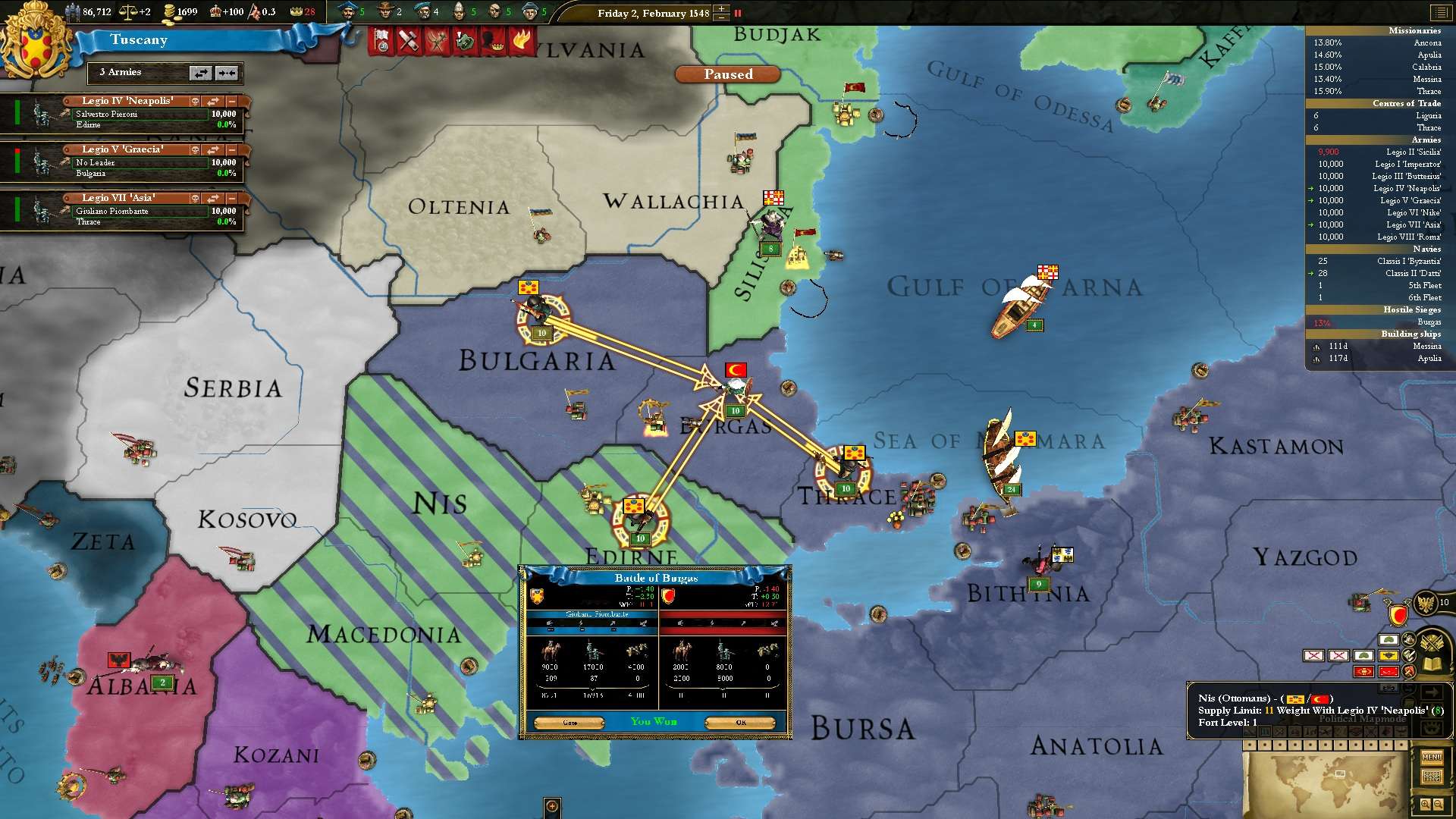
Piombante, unlike Pieroni, had risen up through the ranks. His father was a palace guard; his grandfather, Stefano Piombante had earned considerable respect as the one guard that had supported Andreas Germanicus when John I had imprisoned him. Sir Andreas had never forgotten his debt to the Piombante family. This did not mean that Giuliano was an unworthy General; far from it. He'd joined the legions at age 16 and quickly rose to Lieutenant on the battlefields of the Second Ottoman War. During the wars against the Timurid Hordes, he'd been Commander of the Fifth Legion. Anybody that doubted his courage only needed to take one look at his left leg; he'd lost it at the Battle of Karaman, one of only six casualties in the battle. This injury forced him to remain on horseback. Even his victory at the battle of Burgas had not been without price; he'd actually lost his eye when his pistol misfired. He feared he'd have to retire after this war; his injuries were not mortal, but they did keep him from getting too close to the battlefield.
Still, he had earned an impressive victory, and he smiled broadly. The war was surely close to its end.
--------------------------------------------------------------------------------------------------
6 April 1548, the Castle St. Maso
In a little less than a year, the Empire of Tuscany had been triumphant! There were four new Tuscan provinces, and the Ottoman capital was now completely isolated. Emperor Francis I had signed a cease fire after the fall of Diamentia on 8 March 1548; he'd occupied all the land he cared to. It took another month to get Senate approval for the treaty; he'd also wanted the province of Budjak, but that would have put the Empire on border with Crimea, which had grown surprisingly large. It would have meant more wars with a horde, and it would be over land that wasn't necessary to fulfill Tuscany's mission. The Senate had voted against Budjak by a vote of 6-1-1; only Archduke Graecus, predictably, had been in favor of adding yet more land to his Archduchy.
With Budjak removed, the entire Senate (even Campofregoso) voted in favor of the amended peace deal, and the Sultan had signed it earlier that morning.
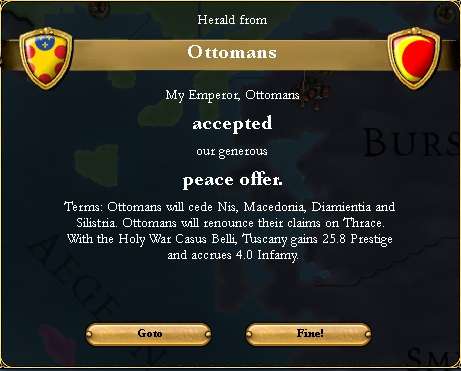
Emperor Francis I was all smiles as he addressed the Senate. "We have won a great victory, not only for the Empire of Tuscany, but for Christendom as well. The Empire of Tuscany is now spread across three continents, something few other countries can claim. Our Legions and the Imperial fleet have performed exceptionally well. As with any successful war, many people were necessary to ensure victory, and I'd like to thank them personally.
"Our brave General Piombante was wounded in the course of duty. By Sir Andreas' request, he will serve as Deputy Commandant of the Legionary Academy, until such time as Sir Andreas retires. At that point, he will become Commandant. General Pieroni will remain in the field as General-in-Chief of our forces in Asia.
"What most of you are the most curious about, however, is the new Duchy which I have to award. It has been common practice, in the past, to name a commanding General to a Duchy that he has conquered.
"This will not be the case."
Many were stunned. While General Piombante neither expected or wanted a patent of nobility, General Pieroni was furious. He'd been neatly trapped; he'd have to stay in the military! He already missed the luxuries of home, and his soldiers fairly hated him. To add insult to injury, Archduke Graecus had assigned his son, Demosthenes, as "advisor" to the unit. As the son of the second most powerful man in the Empire, he already had more credibility with the troops than Pieroni did.
"Instead, I am creating a new Archduchy, as I anticipate many more conquests in Africa in the future. The new Archduke of Africa will be none other than Sir Andreas Germanicus!"
Sir Andreas was completely taken by surprise. With tears in his eyes, he accepted the Emperor's generous offer. Although he only had one province, he was an Archduke now; that made him third in the Empire, behind only the Emperor and Graecus. He finally had something to pass onto his children and grandchildren instead of just a basic patent of nobility.
"Thank you very much, Emperor Francis. My grandson will continue to serve as Senator in my stead; I, however, shall depart for Diamentia as quickly as I can. General Piombante will become the new Commandant of the Academy sooner than I thought."
Everybody applauded. One of the greatest wrongs inflicted by von Brecht had been righted. Even Foreign Minister Iskander was pleased; further conquests in Africa could mean either war with Castille over Alexandria or, better still, a crusade to restore the Holy Land to Christianity.
-------------------------------------------------------------------------------------------------
18 December 1549, Naples
With the Semi-centennial Jubilee quickly approaching, Francis I paused to reflect on the events after the conclusion of the Third War with the Ottoman Empire. A rebellion in Diamentia had quickly been thwarted by the Legio II 'Sicilia', still stationed there for the time being. The citizens of Abruzzi openly and enthusiastically embraced the Lombard culture, as an important province of the former Kingdom of Naples integrated even more closely with the Empire of Tuscany.
The big surprise in foreign news was another war involving the Ottoman Empire. Transylvania had taken Budjak, leaving only Edirne as Ottoman Territory. Francis smiled to himself; the moment the truce was over he'd finish them off. Crimea vassalized Astrakhan; he was distantly concerned about how large Crimea was becoming. Hopefully Muscovy could take them down a peg or three. The last significant change had happened a few hours ago; the creation of a new legion, the Legio IX 'Italia'. It was only a matter of time before Tuscany inherited Milan; perhaps his own son would be the first Emperor of Italy!
With that cheery thought, he considered his next move after the Jubilee. As had become tradition, he'd ordered a comprehensive review of the state of the Empire. It meant a lot of work, but it was crucial.
--------------------------------------------------------------------------------------------------
[1] Apparently Andreas is nearly immortal; he'll have been Commandant for 79 years in 1550 (!!)
[2] A minor event I didn't save a screenshot of; reduces spy defense by 25% for a year or two, I think. The other choice was to lose stability; with overextension, I live in mortal fear of that.
[3] The author of this post does not share the opinions of his characters
We'll have the State of the Empire sometime this weekend; after that, this will be on a temporary hiatus as I'm going out of town for two weeks on a research trip. I'm not sure what kind of internet access I'll have, and my laptop can't run computer games very well, so I won't be able to play.
Last edited:
interesting that despite the overextension, Tuscany continues to grow.
It would seem that God is pleased with the Protestantization of Rome
I too am amazed at your willingness to expand despite acquiring the potentially debilitating Overextension modifier! Sure, it's a piece of cake as long as you get a choice between a stab hit and something else... But all it takes is a couple of comets to really put a crimp in your week. 
The Ottomans are basically dead in the water now, yes? Maybe it's time to get that nasty Austrian rash in Serbia checked out. I can't imagine they will be any sort of agreeable neighbour in the Balkans.
The Ottomans are basically dead in the water now, yes? Maybe it's time to get that nasty Austrian rash in Serbia checked out. I can't imagine they will be any sort of agreeable neighbour in the Balkans.
you do seem to be ignoring over-extension somewhat ... & my (ancient) Roman History is ropey but was it Drusus or Gauis Germanicus who had a bit of a thing about horses in managerial positions?
Good update! As you're aiming to re-create the Empire of old, I guess you will have to live with over-extension...
EDIT: I think Caligula made his horse a member of the senate or something like that...
EDIT: I think Caligula made his horse a member of the senate or something like that...
Nice!
You have an advisor for 72 years? In Medieval Times?
and you used the same pic twice, maybe you didn't notice, just a reminder.
You have an advisor for 72 years? In Medieval Times?
and you used the same pic twice, maybe you didn't notice, just a reminder.

